
Preparing your stay in the Netherlands
Finance and housing
It's very important to look into student accommodation on time. Besides that, make sure to check out the information about opening a Dutch bank account if you don't have one already.
Information about opening a bank account in the Netherlands
This text addresses a few financial aspects typical for the Netherlands, which could make your stay a lot easier.
Why a Dutch bank account?
A Dutch bank account helps you with your financial needs in The Netherlands during your stay. More specifically it enables you:
- To pay the annual tuition fee for your study in equal instalments (for instance, per month)
- Make low value payments in shops, at school (canteen), vendor machines etc.
- To do PIN transactions in the Netherlands, free of charge
- The bank card enables use of ATMs and payments all over the world
- Easy internet banking, which is included in your bank account application
How to open a Dutch bank account?
Visit the banks of your choice and provide the following documents:
- Your valid passport, of which a photocopy will be made
- A proof of enrolment or registration at Fontys
- Your residence permit for the Netherlands or the approval letter of the Dutch Immigration
- Service (IND) in case you do not have your residence permit card yet.
- Your citizen registration number (BSN). You have received this number at your registration at the City hall. Or you will receive it shortly after your registration. Some banks allow you to hand in the BSN later (max 6 weeks)
- Proof of your address (copy rental contract of your room)
- If you do not have a BSN number fill in Tax of Identification Number / Social Security Number home land.
Note:
In case you are a minor (<18) opening a bank account will not be easy. Bring the personal data of one of your parents, a home address and an email address. You are allowed to hand in your citizen registration number (BSN) at a later moment. If you have a birth certificate with you it will be of help.
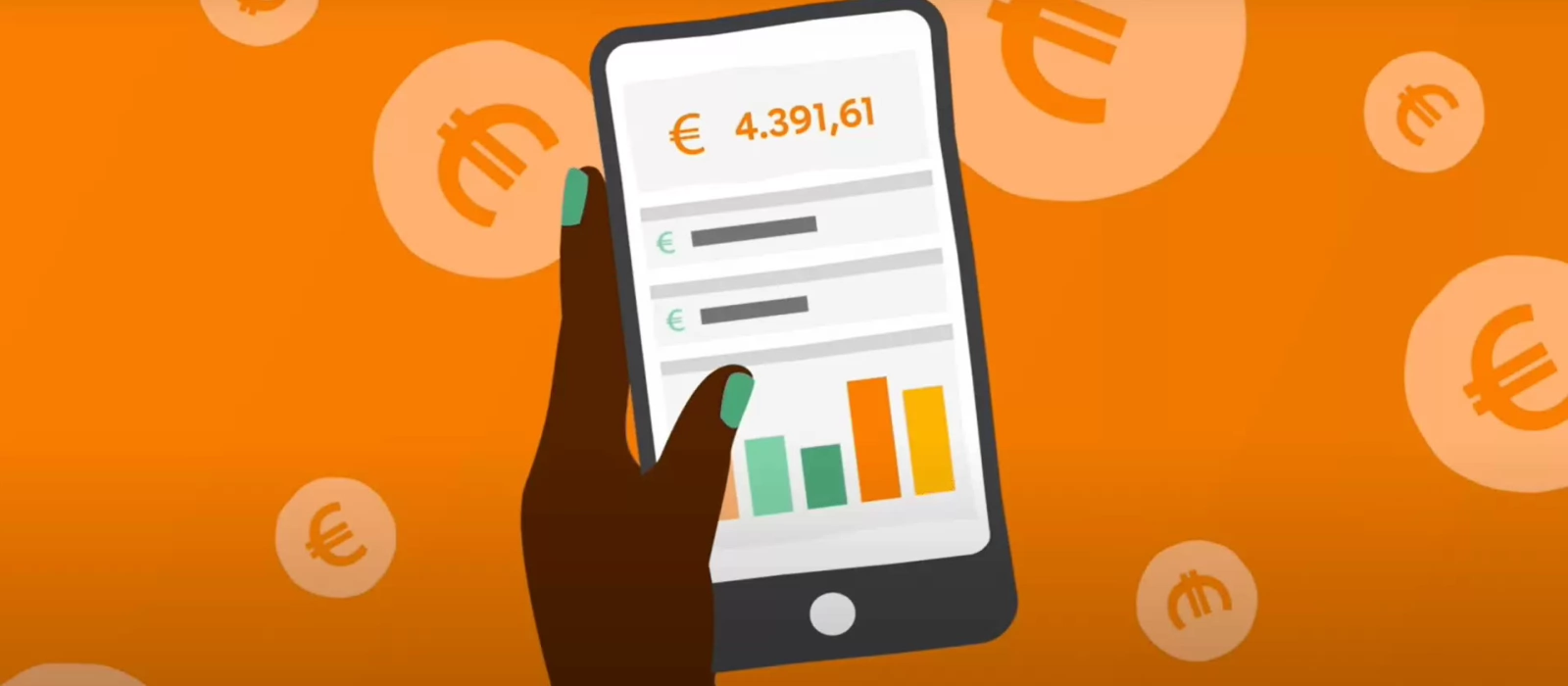
Opening a bank account
Study in NLFurther instructions will be provided by the bank of your choice:
Finding accommodation in Venlo for only 4 months is not always easy. Unfortunately Fontys is not in a position to assist you in your search. We advise you strongly to search at commercial housing agencies, facebook groups etc.
Make sure to start your search as early as possible. If you are an EU student, you can also consider looking for accommodation across the German border, e.g. Kaldenkirchen is a city which is very close to Venlo and easy to reach by bike. Check out our website for more tips.
In Plymouth, students look for accommodation on their own. Most students find accommodation by searching online or by asking alumni. In general, it is not difficult to find good accommodation in Plymouth within two weeks.
Student Accommodation in Venlo
Venlo offers a number of apartments which can be rented by students. Please note that additional costs may be charged by commercial accommodation agencies. In those cases, Fontys does not act as a broker. Please also be informed that student houses are scarce in Venlo, so make sure to start looking for housing in time.
Student Service Centre
If you have any questions about the financial or administrative consequences of moving to the Netherlands, or about living in Venlo in general, please do not hesitate to contact us via internationalstudents@fontys.nl.
Brixhousing
Visiting Address (by appointment only):
Kaldenkerkerweg 2
5913 AD Venlo
+31(0)77 390 59 44

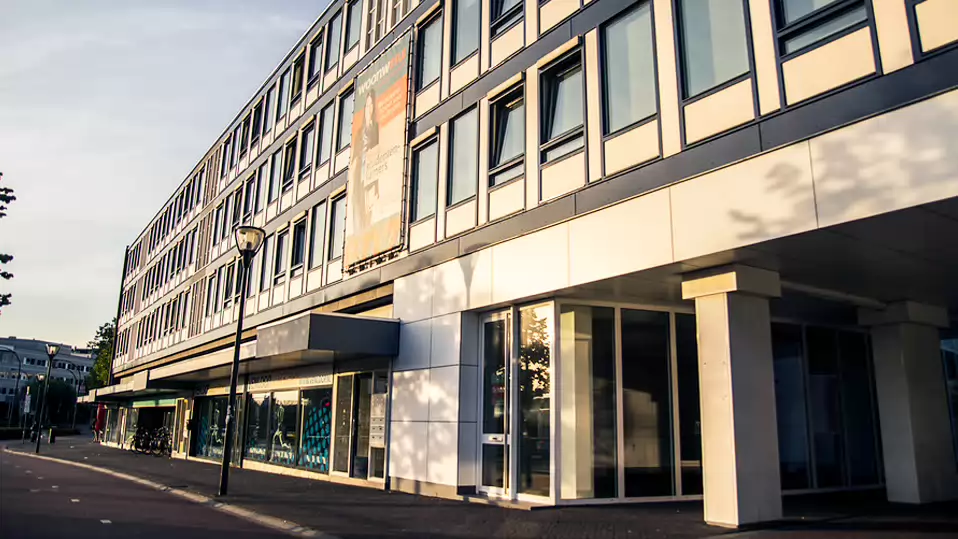
Finding rooms online
There are various websites and Facebook pages where you can find rooms in Venlo.
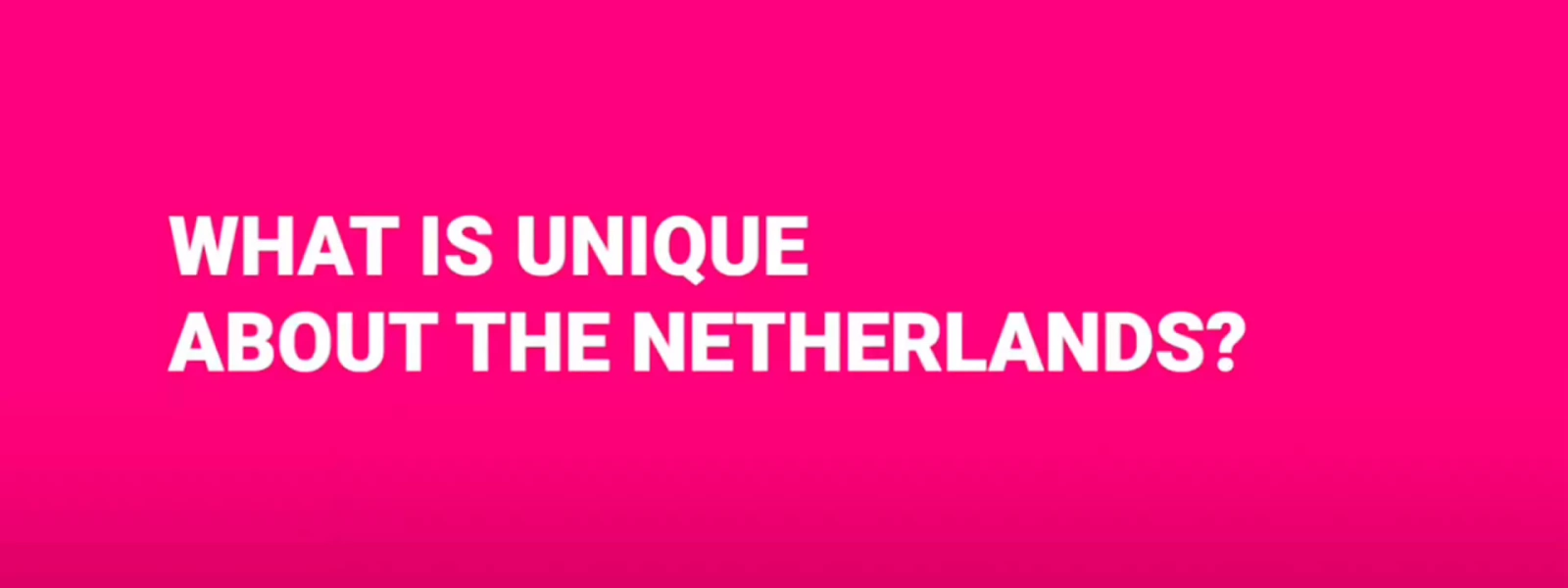
Thnigs you need to arrange before living and studying in the Netherlands
Healthcare in the Netherlands
Healthcare in the Netherlands ranks amongst the best in the world, giving people access to the most advanced treatments and preventative care. Some things, however, may be arranged in a different way than you are used to.
The biggest difference will be the central role of the General Practitioner (GP), in Dutch called the huisarts.
Your GP is the key to the Dutch world of medicine. The GP treats patients for basic problems and can answer most of your general health questions. (S)he will also perform, for example, standard gynecological or pediatric examinations. Your GP will also serve as your link to most other services, such as hospitalization, specialists, home nursing midwifery and physiotherapy. If you call the GP’s office to make an appointment, the GP’s assistant will ask questions to determine the urgency of your situation. The GP’s assistant is a professional and has an obligation of secrecy. Asking questions is done only to have the patient and the doctor better prepared, to suggest alternatives, like a consultation by phone or video, or in some cases, to check if more immediate action is required. If your GP cannot diagnose or treat a problem (s)he will refer you to a specialist. Your GP will usually provide you a letter of referral to be given to the specialist, whom you in turn will call for an appointment. You can however, visit other primary care providers, such as a midwife, physiotherapist or dentist without a referral from your GP.
Most medicines require a prescription from your GP after a personal consultation, since they can be potentially harmful. However, after a consultation, it is possible you will receive a diagnosis but no medication. Dutch physicians believe it is often best to let an illness run its course without expensive and potentially dangerous tests and medication.
It is strongly recommended to register with a GP in your area as soon as you are settled.
Note: You are obliged to be health insured in the Netherlands.
Important links
Healthcare insurance
By law, you must have an adequate healthcare insurance, to make sure that you are properly insured during your stay. The type of healthcare insurance you need depends on your personal situation.European (EEA) students should ask their own health insurance provider if the existing health insurance policy offers sufficient coverage for medical expenses in the Netherlands. You have to complete your insurance package to cover liability and repatriation.
Students from Europe having an EHIC card have to check if this insurance will be valid the entire periode of the stay abroad. This is often not the case.
Our recommendation
Fontys recommends the international student-minded health insurance company InsureToStudy One of the many advantages (different to other companies) is that you don't need to declare the costs of your GP visit, because the invoice will be send directly to the insurance. Besides that ITS also reimburses if a student consults a digital doctor.
As a Fontys student you will get a discount.
This insurance covers:
- Healthcare
- Extraordinary costs
- Repatriation
- Liability
- Accidents
- Legal aid and baggage
- Household goods
This offer is accessible for all international Fontys students who wish to apply for this insurance or want to change their current insurance.
How to apply
If you apply through the button down below you will receive the discount automatically. You have to fill in the institution code "FONTYSITS" and you have to use your @student.fontys.nl email address.
I want to applyIf you have questions about the insurance you can contact insureToStudy through mail: info@insuretostudy.com or call 0031 70 2051860.
- New Non European students are, at least for their first year, obliged to take out the InsureToStudy Master Plan+ insurance which is part of the Fontys Visa procedure.
- The Master Plan + insurance offers a very comprehensive coverage relative to the Master Plan insurance. The Master Plan + insurance includes conditions which already exists prior to applying for this insurance, for instance asthma, diabetes, eczema, migraines, but also disadvantages have continued from previous operations. You can even apply for this insurance if you think you're suffering from the coronavirus. The Master Plan + insurance can be applied for by yourself, only by this link.
- The Master Plan does not cover existing conditions and disadvantages, this concerns the costs that were to be reasonably expected at the start of the insurance.
Note: You are not allowed to take out a public Dutch health insurance if you are in the Netherlands for study purposes only.
If you cause an accident and someone is injured or if you damage someone's property, you are responsible for paying all the costs of the accident. You might, for example, break something in your rented room. Or, on a more serious note, you might cause a road accident. Accidents like these can be very expensive. You are therefore strongly advised to take out a good liability insurance policy, which will cover the costs in many cases.
Repatriation means returning to your home country. If anything (serious illness or accident) happens to you in The Netherlands, your insurance should cover the costs of repatriation of yourself (e.g. for treatment required in your home country), or having your parents travel to join you here. Repatriation is also covered for family member in the 1st and 2nd degree by death or very serious illness It would be wise to have an insurance policy covering these costs.
Be sure to extend your insurance in time. If your current insurance is not InsureToStudy and you want to profit the benefits of the ITS insurance you can easy change your insurance.
Contact ITS
Mail: info@insuretostudy.com
WhatsApp: +316 36264401
Phone: +3170 2051860
If you have a student job or a paid internship you are obliged to take out a Dutch basic healthcare insurance. If you already have an InsureToStudy insurance (or if you are willing to take out one), you can profit a very low priced Dutch basic healthcare insurance combination with Hollandzorg.
Apply here for Hollandzorg Read more about the Dutch basic healthcare insurance.Start your preparations early
The Fontys University of Applied Sciences has an agreement with the Dutch Immigration & Naturalisation Service (the ‘IND’) to apply for Entry Visas and Residence Permits on behalf of its students. The required procedure will be commenced before you travel to the Netherlands. Although the ‘IND’ generally processes applications within two-three weeks, we recommend that you start the process early, i.e. approximately three months before you plan to enter the Netherlands, as it may take some time for you to gather all of the required documentation.
Disclaimer Fontys University of Applied Sciences retains the right to refuse to apply for a student visa/residence permit if there are significant concerns about the applicant's intended purpose of stay in the Netherlands. In this regard, Fontys reserves the right to require an additional motivational letter/ questionnaire and/ or (online) interview.
Residence Permit (‘VVR’)
All those who enter the Netherlands with or without an Entry Visa (‘MVV’) and who wish to stay for a period of longer than three months, are obliged to apply for a ‘Verblijfsvergunning regulier’, or ‘VVR’ (a Residence Permit). Fontys Team International Students will send the application to the Dutch Immigration & Naturalisation Service (‘IND’) on your behalf. Your Residence Permit will be ready soon after your arrival in the Netherlands.
The Dutch immigration service (IND) will grant you a residence permit which is valid until three months after the expected end of your study program. In spite the expiry date on your residence permit card these additional 3 months are only valid after graduation and will be effective starting from your graduation date ( BA / MA) or final date of Exchange.
To enter the Netherlands for the purpose of studying, you may require a visa and/or a residence permit, depending on the following factors
- Your nationality, i.e. as stated in your passport.
- The duration of your stay, i.e. for less or more than three months.
- The purpose of your stay, i.e. we assume that you intend coming to the Netherlands to study, or for a preparatory year.
Entry Visa / Authorisation for Temporary Stay (‘MVV’)
All non-EU/EEA students entering the Netherlands will require an Entry Visa (‘MVV’), except nationals from Australia, Canada, Japan, Monaco, New Zealand, South Korea, the UK, the USA and Vatican City State. This Entry Visa is a sticker that is placed in your passport and is issued by the Dutch embassy or consulate in your country of origin.
Additional conditions for students of the following nationalities: Nepal, Bangladesh, Pakistan, Cameroon and Nigeria.
Students of these nationalities have to be aware they have to transfer the full refundable amount of the living expenses to the bank account of Fontys. Proof by financial documents you have access to this amount will not be accepted.
When registering with your local council, you are automatically issued a BSN.
BSN is short for Burger Service Nummer, which translates as ‘citizen service number’. The BSN is equivalent to a social security number: a unique registration number for every citizen, used in contacts with any government service.
Various people may ask for your BSN:
- If you have a job, your employer will need to know your BSN.
- When you open a bank account the bank will also ask for your BSN.
Some study departments arrange the appointment for international students. Please check with your study department if you need to make the appointment yourself or if they will arrange it for you.
Bring the following documents to the appointment
- A valid passport
- Original birth certificate or original legalised true copy of the birth certificate (not older than six months). If your birth certificate was not issued in the Dutch, English, French or German language, you will also need to submit a sworn translation. Additional stamps, from the government of the country which issued the birth certificate, might be required. In order to confirm which legalisation you are required to have, you must contact the Dutch Embassy or Consulate in your own country. Please check https://www.netherlandsandyou.nl to find details of your local Embassy or Consulate
- Proof of civil status only in case you are married, divorced or a widow(er). In Venlo it’s always necessary to bring a proof of civil status
- Rental agreement for your room in the Netherlands
- Declaration of acceptance by Fontys University of Applied Sciences
- Print of the approval letter of the Dutch Immigration Service (IND) if applicable
If you are going to change your address or move to another city do not forget to inform the municipality. If your study period ends and you want to leave the Netherlands, you have to deregister.
Note: The landlord of your room can ask you for proof of deregistration at the municipality as a condition to get your deposit back.
Extra information for students from China
Chinese students are required to bring the following documents in addition:
- Legalized notarized declaration* which includes family name, given names, date of birth, place of birth, name of father and name of mother and a notarized certified true copy of the document or documents on which the notary has based his statement regarding the birth and the data of the parents.
Documents that will be accepted:
- Hukou of the parents in which the birth of the child is registered and a declaration of the hospital which explicitly states that this statement can be used for the registration of the birth in the Hukou registry;
- A statement from the Public Security Bureau where the requested data prove out;
- Notarized certified copy of the updated and complete Hukou of the child itself.
This should be done as soon as possible, as the legalisation process can take a number of months.
Information about legalisation of foreign documents for use in the Netherlands.
Work permit
If you want to work during your studies while staying in the Netherlands, there are some things to keep in mind.
- Are you from the EU/EEA or Switzerland?
If you are from the EU/EEA or Switzerland you are free to work without restrictions. You do not need a work permit and there are no restrictions regarding working hours.
- Are you from outside Europe?
If you are not from the EU/EEA or Switzerland, there are some restrictions if you want to work alongside your studies. You can either work for a maximum of 16 hours a week during the year, or you can work fulltime during the months of June, July and August, but only with a work permit.
Work Permit Application Process:
Your employer has to apply for your work permit (Tewerkstellingsvergunning or short the TWV) at least 5 weeks prior to the start of your employment. The application is free of charge. You cannot apply for the permit yourself. The organization that issues work permits is called the Employee Insurance Agency (UWV). The work permit application must be accompanied by a copy of your residence permit for study purposes and a statement from your education institution confirming that you are enrolled as a student at that institution.
In the case of students seeking to work part-time alongside their studies, there is a simplified application procedure whereby the UWV does not have to perform all the checks stipulated in the Foreign Nationals Employment Act (Wet arbeid vreemdelingen, WAV). Employers are not always aware of this simplified procedure and may therefore be wary about applying for a work permit. There is no need for this, however.
This is the website for your employer to apply for your work permit as a work student:
Apply for work permit
The Inspectorate SZW carries out inspections to check whether work permits were issued. If they were not issued this constitutes illegal employment, which is a violation of the Foreign Nationals Employment Act and punishable with severe fines for your employer and the risk for you to lose your residence permit.
Note: As soon as you have a (part-time) job, you are required to have a Dutch public health insurance.
In addition to your studies, you are allowed to work in the Netherlands as a self employed individual, as long as you continue to meet the requirements for your residence permit for study. There is no limit to the amount of hours that you are allowed to work as a self employed individual. Also, you do not need a working permit (TWV).
You do need to register your company in the Dutch Chamber of Commerce (Kamer van Koophandel). You need to pay taxes yourself. Whether it is compulsory for you to take out Dutch public healthcare insurance depends on your situation. To find out, you can undergo a Wlz review carried out by the SVB.
The employer does not need to apply for a work permit for you. The employer must, however, be able to present an internship agreement to the Labour Inspectorate, upon request.
You are legally obliged to sign an internship agreement with your higher education institution and internship employer. We strongly advise you to use the standard internship agreement for non-EU-EEA students drawn up by Nuffic in consultation with the Dutch government.
student trainee agreement (three party contract)
Note: If you are doing an internship for which you are paid at least as much as the Dutch minimum wage, you are subject to compulsory insurance under the Wlz scheme. Check this explanation of the minimum wage. If you receive expenses this will also count as remuneration for your internship. Contact the SVB (Sociale Verzekeringsbank), which is the organisation that implements national insurance schemes in the Netherlands and start the Wlz assessment when you are in doubt.
Checklist arrival in the Netherlands
For all international students, EU and Non EU-students
Important documents / useful items
- Valid passport (including visa, if needed);
- Sufficient funds for the expenses that you will incur during the first month of your stay. You will need to take into account payment for your accommodation (including a security deposit) and your general living expenses;
- Medical records;
- Arrange health, liability and repatriation insurance (for EEA students);
- Important addresses and telephone numbers (e.g. contact numbers for Fontys, your accommodation, your country’s embassy, et cetera);
- The original diploma and certified copies diploma and grade list both in original language and translation (if applicable, joined by a translation made by a sworn translator);
- Arrange accommodation (only if you haven't applied for accommodation via Fontys);
- Proof of vaccination.
Important documents you will need to register at the City Hall
- Proof of civil status only in case you are married, divorced or a widow(er);
- Rental agreement for the room in the Netherlands;
- Copy of admission letter of Fontys University of Applied Sciences;
- Original birth certificate or original legalised true copy of the birth certificate (not older than six months) If your birth certificate was not issued in the Dutch, English, French or German language, you will also need to submit a sworn translation.
Additional stamps, from the government of the country which issued the birth certificate, might be required. In order to confirm which legalisation you are required to have, visit this website. Please check www.netherlandsandyou.nl to find details of your local Embassy or Consulate.
- Your passport, including a ‘Machtiging tot Voorlopig Verblijf’, or ‘MVV’ (an ‘Authorisation for Temporary Stay’) if you are a student hailing from a country for which an Entry Visa is required;
- Print of the approval letter of the Dutch Immigration Service (IND) (if you have applied for a Dutch residence permit STUDY);
- Print of your InsureToStudy insurance policy. Save the attached scan in your cell phone Please note: Fontys has arranged this student insurance on your behalf. InsureToStudy has sent you, beside the pre-policy, a link to pay the premium digitally. You have to pay for the insurance offered by InsureToStudy before your departure to the Netherlands. The Dutch Immigration Service requires a student insurance beside your residence permit for the Netherlands. The insurance card and the overview of the cover of the policy will be sent to your Dutch room address. The insurance company will contact you after your arrival in the Netherlands to ask your room address. Look at their website (downloads) for more information about the cover: https://www.insuretostudy.com/en/;
- Instructions to locate your country’s embassy/consulate.
- The Tuberculosis test referral form (if applicable). Please print it and fill in all data before you travel to the Netherlands;
Undergo a tuberculosis examination at the Municipal Health Service:
Your study department will arrange an appointment for you at the Municipal Health Service (GGD) or you have to do it yourself. Contact your study department first.
You must print, fill in and bring the Tuberculosis Examination Referral Form (you will receive this form attached to your final email from Visacare), completed as much as possible (Section A) and your passport to the appointment with the Municipal Health Service (GGD). Bring your ID.
The examination requirement does not apply to citizens originated in the following countries.
For students studying in Eindhoven : Immigranten en expats - GGD Brabant-Zuidoost (ggdbzo.nl)
| For students studying in Tilburg | For students studying in Venlo |
|---|---|
| Reitseplein 5 5037 AA Tilburg Zij-ingang - verdieping 5 088 368 7100 Ma t/m vr: 08:30 – 16:30 uur | GGD for TBC check: Oranjelaan 21, 6042 BA Roermond 088-1191716 |
Legalized notarized declaration which includes family name, given names, date of birth, place of birth, name of father and name of mother and a notarized certified true copy of the document or documents on which the notary has based his statement regarding the birth and the data of the parents.
The following documents will be accepted:
- Hukou of the parents in which the birth of the child is registered;
- Declaration of the hospital which explicitly states that this statement can be used for the registration of the birth in the Hukou registry;
- A statement from the Public Security Bureau where the requested data prove out;
- Notarized certified copy of the updated and complete Hukou of the child itself.
This should be done as soon as possible, as the legalisation process can take a number of months.
Ready to study in Venlo?
Studying in Venlo also means living in Venlo. You will meet people in the coziest of places, visit events, have a drink together or you can do sports together to stay in shape. It's all part of your student life!
About the city of Venlo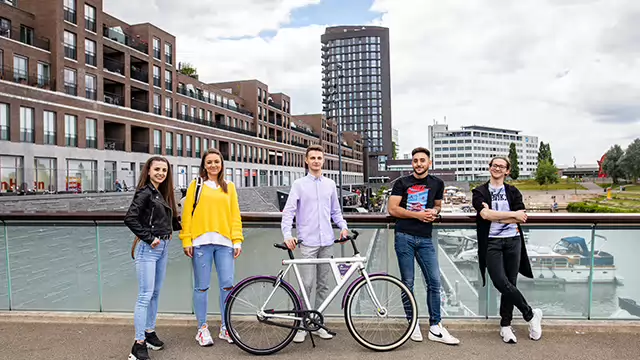
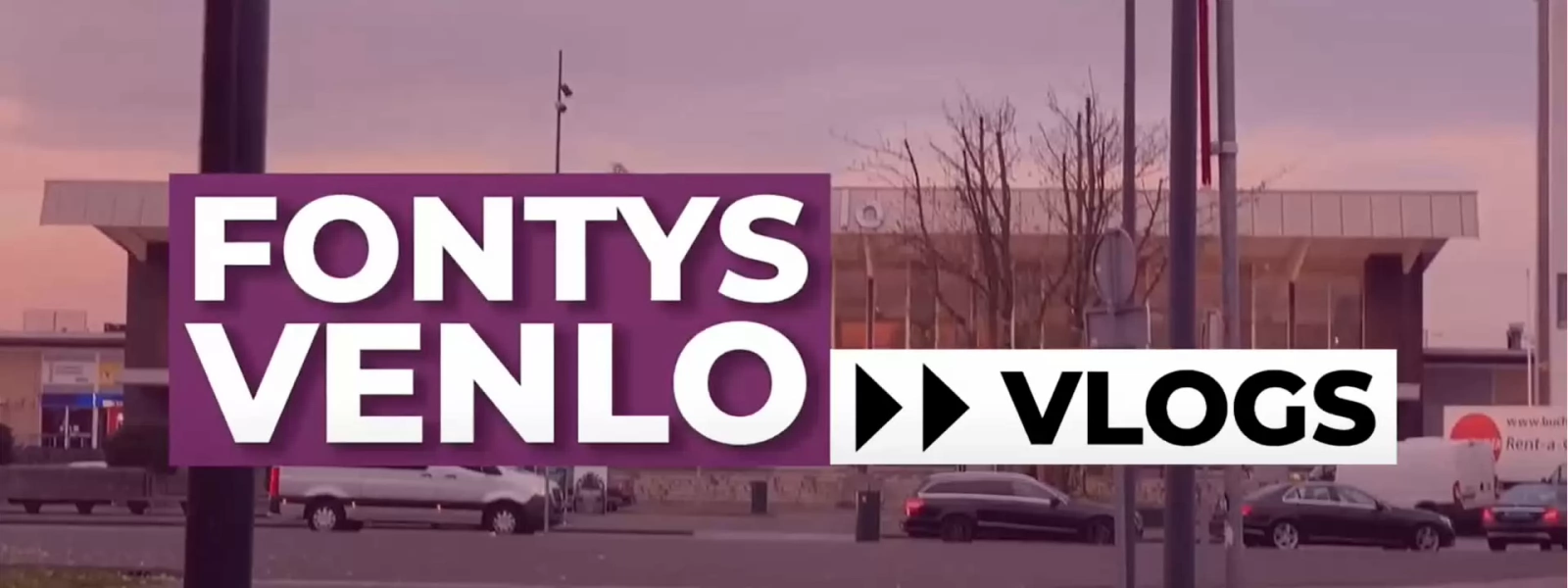
Fontys Venlo vlog
Travelling in the Netherlands
The Netherlands has an extensive railway network and pretty much everybody owns a bike. Interested in ways to get around in your new city? We have put some information together to help you.
In the Netherlands public transport consists of trains, buses, trams and metros. Only Amsterdam and Rotterdam have (moderate) underground railway systems.
If you wish to travel by public transport, using an ‘OV-chipkaart’ (public transport chip card) is strongly advised.
Travelling with the 'OV-chipkaart'
The ‘OV-chipkaart’ is a means of payment for the Dutch public transport system. This smart card is the size of a bankcard and contains an invisible chip. The ‘OV-chipkaart’ can be loaded with credit in Euros, with which you can travel anywhere within the Netherlands, or with a travel product (subscription).
When you arrive in the Netherlands and if you are planning to utilise the public transport system, you will need to visit a public transport Service Desk, a vending machine at a railway station, or a tobacco or convenience store to purchase your ‘OV-chipkaart’.
There are two types of ‘OV-chipkaart’ available, as follows:
- The anonymous ‘OV-chipkaart’ (blue card),
- The personalised ‘OV-chipkaart’ (yellow card).
If you are planning to utilise public transport frequently during your stay in the Netherlands, it is advised to purchase your own ‘OV-chipkaart’.
Request a student travel product How to buy Dutch train ticketsTrains
The Netherlands has an extensive railway network. Intercity trains run regularly between all Dutch cities. Local trains also stop at intermediate stations. On most trains, you can choose to travel by first or second class. Reservations for seats cannot be made on standard train services. If you do not like to use an 'OV-chipkaart', you may purchase one-use tickets from ticket vending machines at railway stations or online. However, check whether any special offers may apply.
Railway stations are generally located centrally. For further and detailed information regarding departure times and fares, please visit the Nederlandse Spoorwegen (Dutch Railways) website, or contact the Public Transport Travellers’ Information Line via the telephone number, +31900 9292 (EUR 0.70 per minute), which can only be called from within the Netherlands. Or visit the 9292 website.
Buses
Outlying villages in the Netherlands are all linked by bus services. All larger towns and cities also have their own extensive bus and/or tram networks and provide regular services. Bus and tram services do not offer separate classes of travel. Buses depart from bus stops and close to the central railway stations.
Visit the 9292 website for information on departure times and fares.Public transport card with discount for international students
Fontys UAS collaborates with Student Mobility to provide international students easy access to all forms of transport in the Netherlands. With Student Mobility you are able to receive a customized public transport card with special discounts for international students! You can use this card for train, tram, metro and bus.
Besides traveling by public transport you probably also want a bike. Student Mobility helps you to get the most suitable bike, leasing or buying.
Student Mobility Card/OV-chipkaart
In the Netherlands you need an OV-chipkaart to travel around with the train, tram, metro and bus. There are two possibilities offered by the NS (National Railway):
▪ An anonymous card without any discount
▪ A personal card, where you need a Dutch debit card and the buying process is written in Dutch
Both options are not ideal for international students. That is why Student Mobility created the “Student Mobility Card”, a custom-made OV-chipkaart for international students. You get the card for €15, - and can sign-up (optional) for services and discounts created for international students for a small monthly fee:
- 15% discount during off-peak hours on national railway (NS)
- A digital ISIC card, with the best discounts in the Netherlands and the rest of the world
- A customized application process for international students
- Automatic top-up option (no more topping op of balance)
- Travel data and customer service in the App
- Public transport bike (OV-fiets) and storage
You can reserve a card here, which includes the public transport card + the digital ISIC card. After confirmation the card will be sent to a (EU) postal address and in case there is a physical intro-event you can pick it up there.
Enjoy your stay in the Netherlands!
The Netherlands is perfect for cycling, as more than 100,000 kilometres of trails and road networks are available (including many cycle paths). The Netherlands has a nationwide network of cycle paths totalling approximately 30,000 kilometres in length.
Wherever using cycle paths is mandatory, this is indicated by a blue sign with a white bicycle symbol. Furthermore, cycle paths can be recognised by a red surface on which a white bicycle is printed. In any isolated locations without marked cycle paths, you may rest assured that drivers are generally very aware of cyclists.
Cycling to get around
One of the most common ways of moving around in the Netherlands is by bicycle. The Netherlands has more bicycles than people. Many people ride a bicycle and then take a train to travel to work or university, as you will see from the large numbers of bicycles parked at smaller railway stations. Larger railway stations have special bicycle parking garages. In the city centre, you will find places where you can park your bicycle. In some cases, such bicycle parking areas are guarded and in some locations, you will be obliged to pay a fee for parking your bicycle. In the centre, all of the guarded parking areas for bicycles are free of charge. It is important to ensure that you park your bicycle in an appropriate location, or you may return from a nice evening out and discover that your bicycle has been removed by the municipal services.
Fun!
The mild climate, short distances and excellent cycling infrastructure make cycling in the Netherlands not only practical, but also fun! Cycling is a good way to discover the Netherlands. You can hire a bicycle and if you are travelling by rail, you can take your bicycle with you. Just do not forget to purchase a special ticket for your bicycle for the train journey. When you go to another city for a day, you can also opt for renting a NS OV-fiets on a train station.
In the southern part of the Netherlands, there is a multitude of challenging routes through hilly terrain, whereas in the western part of the Netherlands, you can cycle through the dunes. If you like mountain biking, there are also plenty of mountain biking routes in the Netherlands.
Getting a bicycle
Buying a new bicycle will cost between EUR 150 and EUR 500, whereas second-hand bicycles are readily available at much lower prices (e.g. as from approximately EUR 60). It is worth asking someone at the university to suggest a shop, to make enquiries at the ‘fietsenstalling’ (bicycle parking area) at the railway station and/or to regularly check the Notice Board at your university. For second-hand bicycles you can also check Facebook Marketplace or Marktplaats. You should be able to purchase a bicycle for a fair price. It is also important to purchase a good lock and/or chain for your bicycle. Some people secure their bicycles to immovable objects with steel chains to prevent theft. Please note that riding a bicycle without operational lights at night is illegal in the Netherlands, so make sure your bicycle has operational lights.
Instead of buying a bicycle, you can also opt for a subscription with Swapfiets, which includes repairs for a set rate a month.
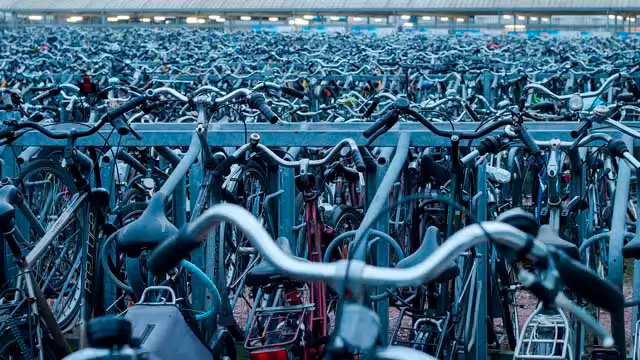
Useful links
To do in Venlo
- Going out in Venlo
- Event calendar
- Study in Venlo
General
- Shopping
- Useful apps
- In case of emergency
- Dutch News in English
- Holland.com - Your guide for visiting the Netherlands
